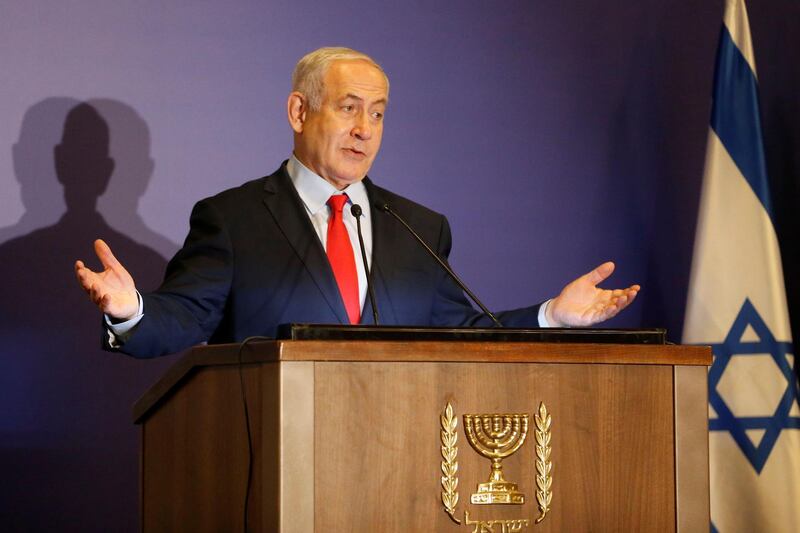Israeli Prime Minister Benjamin Netanyahu said on Monday that Arab countries viewed Israel as an "indispensable ally" fighting Iran and ISIS because of the country's strategic role in battling them.
That evaluation, he told Brazil's Globo TV during a visit to Rio de Janeiro, has caused "a revolution in relations with the Arab world".
In October, Mr Netanyahu visited Oman's Sultan Qaboos bin Said in a rare visit and then Chadian President Idriss Deby who he told of plans to visit further Arab states soon.
On his visit to Oman, he took a private jet and flew over Saudi Arabian airspace, despite commercial Israeli flights not being permitted to do the same. Only two Arab states have normalised diplomatic relations with Israel: Egypt and Jordan. But public opinion in those countries remains staunchly anti-Israel and Mr Netanyahu rarely pays public visits to them.
The comments came as Israel has stepped up air strikes on Iranian positions in neighbouring Syria, and as Israel digested an abrupt decision by President Donald Trump to withdraw US troops from the conflict.
Mr Netanyahu has repeatedly warned that Iran is trying to develop nuclear weapons to destroy his country. Iran has maintained that it's nuclear development — significantly curtailed in line with the Joint Comprehensive Plan of Action signed with international powers in 2015 — was for peaceful energy production.
Israel, Mr Netanyahu said, had shown itself to be active in battling "radical Islam, violent Islam — either the one led by radical Shiites led by Iran, or the one led by the radical Sunnis led by Daesh (ISIS) and Al-Qaeda." Daesh is an oft-used Arabic acronym for ISIS.
"Unfortunately we have not made any advance with the Palestinians. Half of them are already under the gun of Iran and of radical Islam," Mr Netanyahu added.
Asked if he could ever contemplate sitting down with an Iranian leader to talk peace, Netanyahu replied: "If Iran remains committed to our destruction the answer is no."
The only way, he said, would be "if Iran undergoes a total transformation."
Mr Netanyahu was in Brazil to attend Tuesday's inauguration of the Latin American country's new, pro-Israel president, Jair Bolsonaro.
On the sidelines of the ceremony, Mr Netanyahu was to hold talks with US Secretary of State Mike Pompeo, who is also among the visiting dignitaries.
They were expected to discuss the US troop pullout from Syria and Iranian activities in the Middle East.
The Israeli leader is currently mired in domestic troubles, with several cases for alleged corruption hanging over him. He said on Monday that he would not resign if prosecutors moved to indict him on corruption charges ahead of an early election called for April.
Mr Netanyahu said he would not step down in the event of being summoned for a hearing by the prosecutor general before the elections, a necessary step ahead of being formally charged.
The prime minister will not be required to resign if charged in any of the three cases of alleged corruption, but he would likely face intense political pressure to do so.
"I have no intention to resign, firstly because there will be nothing (to come from the probes), secondly because the law does not oblige me to do so," Mr Netanyahu said in Rio, referring to the hearing process.
"That would be a serious breach of Israeli democracy," he added.
The attorney general's decision on any indictments is expected in the coming months and analysts say Mr Netanyahu's decision to call early elections was a deft manoeuvre to fight any charges with a fresh mandate.






